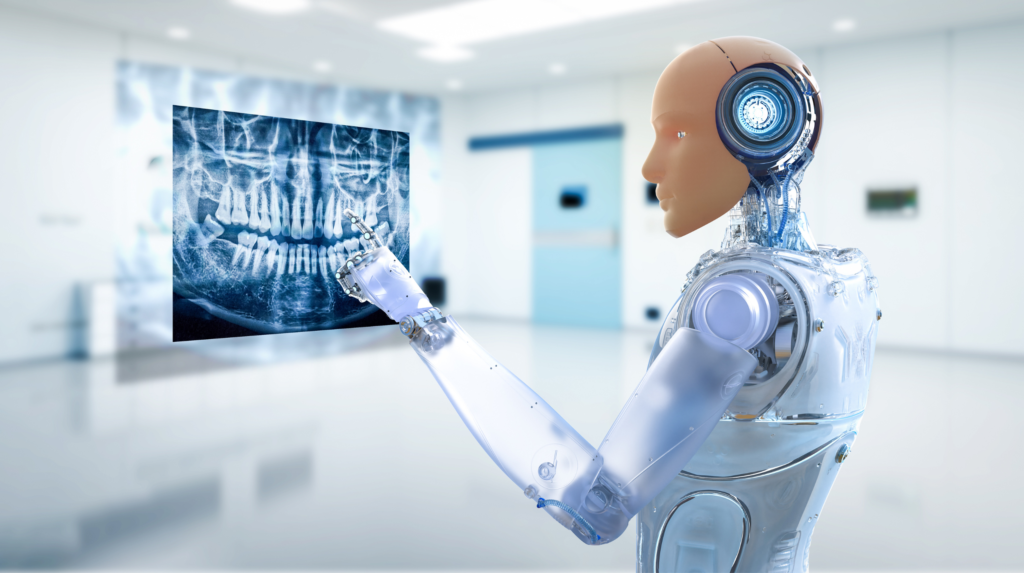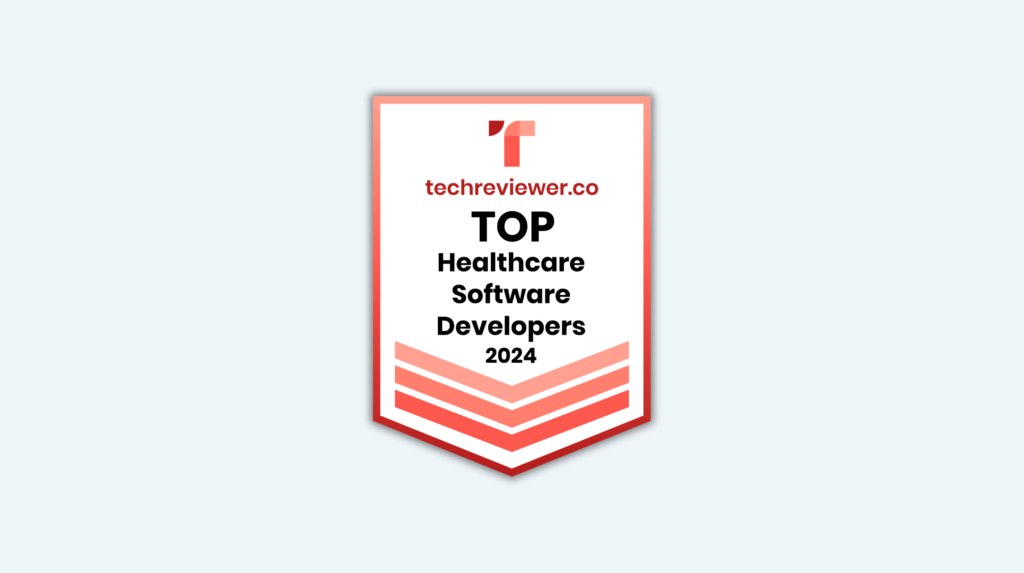Patient medical records are critical to the healthcare system. The data collected on every patient is necessary for healthcare providers to create and implement treatment plans with the best chance of positive outcomes. Patient data helps healthcare professionals adjust strategies, tailoring the treatments and clinical decisions during the time they care for a patient to get the best results.
Electronic Health Records (EHRs) have become a fundamental component of modern medicine. Despite their crucial role and immense benefits, traditional EHR systems often face a lot of challenges. From data entry errors to inefficiencies and difficulties in accessing comprehensive patient data, there has been a need for significant improvement.
The rising popularity of Artificial Intelligence (AI) integration into different sectors might be the key to resolving EHR problems in modern medicine. AI integration is already revolutionizing healthcare as we know it in several ways. The industry is also using AI to improve electronic health records.
This article will explore how AI is revolutionizing EHR systems, including its applications, benefits, and future potential, with a focus on AI medical records, AI for medical records, and how AI can be used to release medical records in healthcare.
The Current State of Electronic Health Records and Its Challenges
The 1960s saw a major improvement in the healthcare system as electronic data processing started gaining popularity. By the 1990s, the transition from paper-based medical records to “electronic health records” was complete and the concept began taking shape.
Initial EHRs were basic digital records, but over time, the healthcare industry incorporated more complex functionalities to them. EHRs developed into comprehensive systems that made accessing and managing patient data easier for healthcare professionals. With the healthcare industry producing 50 petabytes of data each year, EHRs face more challenges, like data fragmentation and cumbersome user interfaces.
What are the Challenges of Existing EHRs?
Manual data entry is necessary for EHRs, and it is a time-consuming process itself. Unfortunately, manual data entry is also prone to human error, which can lead to inaccuracies. Any problems with a patient’s medical records can significantly impact patient care.
Additionally, healthcare providers often face difficulties accessing and sharing comprehensive patient data due to interoperability issues between different EHR systems. This lack of seamless data exchange can lead to fragmented patient care and hinder effective decision-making.
Another significant challenge is the administrative burden on healthcare professionals. Physicians and nurses often spend too much time on EHR-related tasks, such as updating patient records and managing clinical documentation. This can lead to burnout and reduce the time available for direct patient care. Furthermore, traditional EHR workflows’ complexity and inefficiency can slow operations and negatively affect patient satisfaction.
The Need for Improvement on Traditional EHRs
Given these challenges, traditional EHR systems need to be improved. Modern EHRs must address data accuracy issues, reduce administrative burden, and improve data exchange to streamline healthcare delivery. Integrating AI in medical records offers promising solutions to build modern EHRs that easily address these challenges.
AI models can compute extensive datasets, organize them into usable information, and eliminate human error in EHRs. Using AI to improve electronic health records will be one of the new technology’s most important applications.
Market Overview of AI in EHR Systems
The AI in healthcare market, which includes EHRs, is expected to grow substantially, with the market size projected to reach approximately $4.57 trillion by 2036. This growth is fueled by the integration of AI in various healthcare applications, including clinical decision support and patient data management, which aim to enhance the accuracy and efficiency of healthcare delivery.
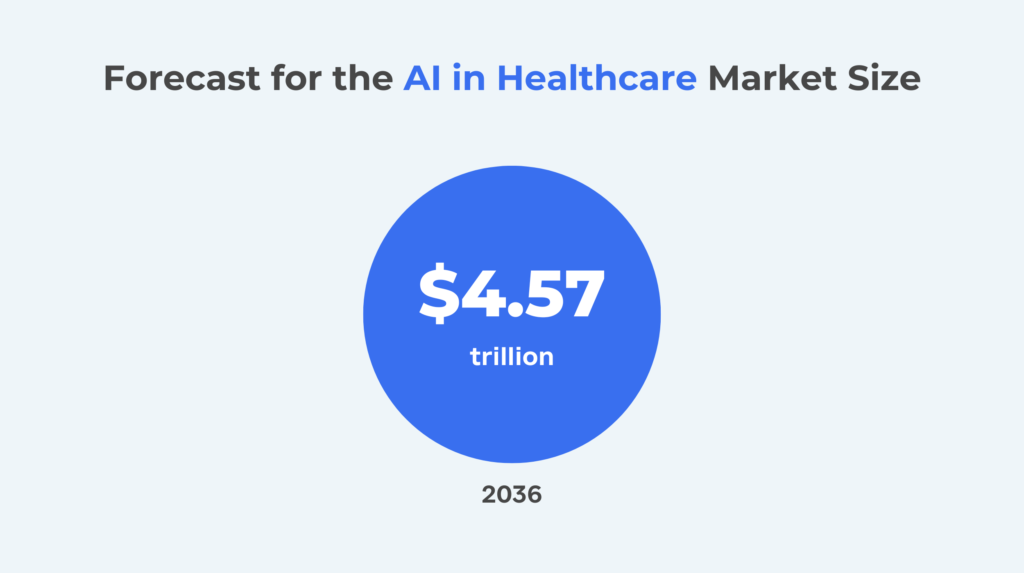
AI technologies, particularly Natural Language Processing (NLP), are being integrated into EHRs to automate clinical documentation and optimize patient data analysis. NLP is expected to play a crucial role in improving EHR functionalities, enabling faster and more accurate data processing.
Rule-based expert systems are also seeing increased use in healthcare to apply AI-powered reasoning and knowledge to assist with complex problems, supplying physicians with clinical decision support, being integrated into EHR systems.
How AI can Enhance Electronic Health Record Systems
Artificial Intelligence (AI) is rapidly transforming the healthcare industry, and its integration into Electronic Health Records (EHRs) is particularly noteworthy. AI in medical records involves using advanced algorithms and machine-learning techniques to process and analyze vast amounts of patient data. This helps improve the accuracy, efficiency, and overall functionality of EHR systems. By leveraging AI, healthcare providers can enhance data management, streamline workflows, and improve patient care.
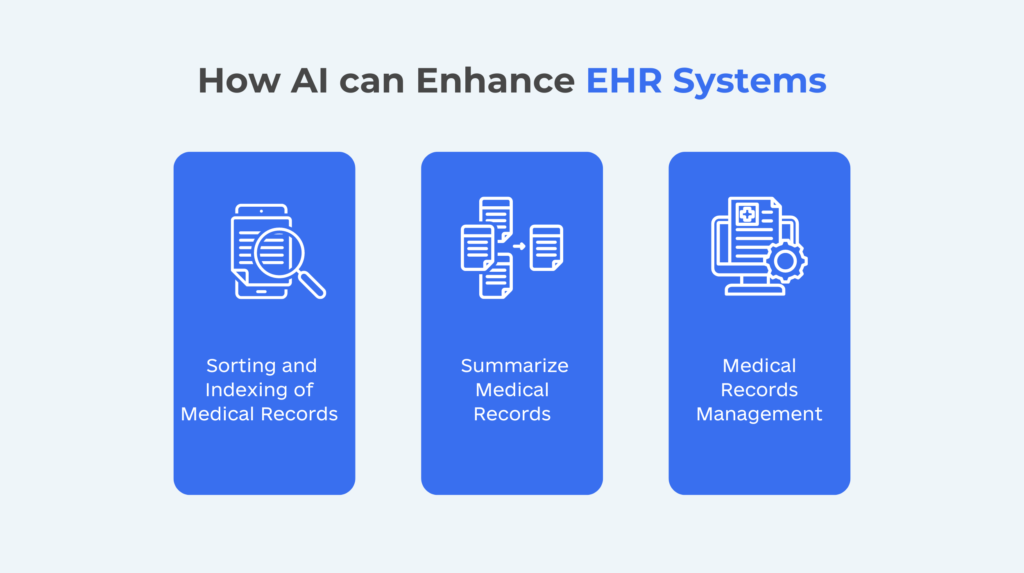
AI for Medical Records Sorting and Indexing
One of AI’s primary applications in EHRs is sorting and indexing medical records. Traditional EHR systems often struggle with organizing large volumes of patient data, leading to inefficiencies and difficulty accessing information. AI algorithms can automatically categorize and index medical records, making it easier for healthcare professionals to retrieve relevant data quickly. For example, AI can sort patient records based on various parameters such as diagnosis, treatment history, and lab results. This saves time and reduces the risk of errors associated with manual data entry and organization.
AI medical records sorting and indexing capabilities are particularly useful in large healthcare facilities where the volume of patient data can be overwhelming. By automating these processes, AI ensures that healthcare providers have instant access to critical information, enabling them to make informed decisions more efficiently.
AI to Summarize Medical Records
Another significant benefit of using AI in EHR systems is its ability to summarize medical records. Physicians often have to sift through extensive patient histories to identify relevant information, which can be time-consuming. AI-powered systems can analyze patient data and generate concise summaries, highlighting key details such as past diagnoses, treatments, and current medications. This feature is especially useful during patient consultations, allowing doctors to quickly review essential information and focus on providing quality care.
Using AI to summarize medical records also enhances communication between healthcare providers. For instance, when a patient is referred to a specialist, the summarized medical records can provide a clear and concise overview of the patient’s medical history, ensuring continuity of care.
AI for Medical Records Management
AI for medical records management goes beyond sorting and summarizing data. It encompasses various functionalities designed to improve the overall management of patient information. For example, AI can assist in detecting inconsistencies or errors in medical records, alerting healthcare providers to potential issues that need to be addressed. This proactive approach helps maintain the accuracy and integrity of patient data.
AI can also streamline administrative tasks associated with EHR management. Features such as voice recognition and natural language processing (NLP) enable healthcare professionals to update patient records through dictation, reducing the time spent on manual data entry. AI can also provide autocomplete suggestions for clinical terms and codes, further enhancing the efficiency of data entry processes.
The Applications of AI in EHR Systems
AI has several possible applications in EHR systems that can deliver significant improvements for the healthcare industry, including:
Supporting Diagnostics
One of the most significant applications of AI in EHR systems is providing diagnostic support. AI algorithms can analyze vast amounts of patient data, including medical history, lab results, and imaging scans, to identify patterns and correlations that may be overlooked by human clinicians. By doing so, AI helps make more accurate diagnoses and predict potential health risks. For example, AI-powered tools can flag abnormal lab results or highlight discrepancies in patient records that warrant further investigation.
A notable case of AI being used in diagnostic support is in analyzing radiological images. AI can be trained to recognize specific patterns in medical images, such as X-rays, MRIs, and CT scans, that indicate the presence of diseases like cancer, fractures, or infections. AI medical records integration can thus enhance the accuracy and speed of diagnoses, leading to earlier interventions and better patient outcomes. Studies have shown that AI can achieve up to 98.7% diagnostic accuracy rates in certain applications, such as detecting breast cancer from mammograms.
Improving Medical Image Analysis
AI’s ability to analyze medical images is another critical application within EHR systems. Medical image analysis involves using AI algorithms to examine and interpret images from various diagnostic tools. AI can assist radiologists by identifying areas of concern that might not be immediately apparent, such as small tumors or early signs of disease. This capability enhances diagnostic accuracy and speeds up the review process, allowing radiologists to focus on more complex cases.
For instance, AI-powered image recognition software can highlight potential abnormalities in chest X-rays that may indicate pneumonia or other lung conditions. Similarly, AI can assist in interpreting brain MRIs by identifying regions that show signs of stroke or tumor growth. By incorporating these AI capabilities into EHR systems, healthcare providers can ensure that critical diagnostic information is readily accessible and actionable.
Enhancing Lab Test Analysis
AI in medical records also extends to the analysis of lab test results. Traditional methods of reviewing lab tests can be time-consuming and may miss subtle indicators of disease. AI algorithms can quickly analyze lab data, identify patterns, and detect anomalies that might indicate underlying health issues. For example, AI can flag abnormal blood test results that suggest further investigation, such as elevated glucose levels indicating potential diabetes or abnormal liver enzyme levels suggesting liver disease.
Besides detecting anomalies, AI can also provide predictive analytics, helping healthcare providers anticipate potential health problems before they become critical. By analyzing trends in lab test results over time, AI can identify patients at risk for conditions such as heart disease or chronic kidney disease, enabling early intervention and preventive care.
Making Patient Record Management Easier
Effective patient record management is crucial for providing high-quality healthcare, and AI plays a significant role in this area. AI-driven tools can optimize data entry, reducing the administrative burden on healthcare professionals. For example, AI-powered virtual assistants can transcribe physician notes, update patient records, and even provide real-time assistance during patient consultations. These tools save time and reduce the risk of errors in medical records.
Documentation automation is another key application of AI in EHR systems. AI can convert physical medical records into digital formats, making storing, retrieving, and sharing patient information easier. Additionally, AI can suggest relevant input data based on previous entries, further streamlining the documentation process. For instance, when a doctor enters a patient’s symptoms, AI can provide autocomplete suggestions for common clinical terms and conditions, ensuring consistency and accuracy in medical records.
AI-Powered Medical Billing Systems
One of the most significant benefits of AI in electronic health records is streamlining and speeding up labor-intensive tasks. In addition to the clinical side of operations, it can also improve administrative aspects like billing.
AI algorithms can analyze medical records and billing codes to ensure that claims are accurate and complete before submission. This helps reduce the number of denied claims and accelerates the reimbursement process. AI models can detect insurance fraud by detecting discrepancies early, preventing hospital financial losses.
The Future of AI in Medical Records
AI-Powered Insights and Decision Support
AI is set to turning traditional EHRs into intelligent systems that provide real-time insights, clinical decision support, and personalized care recommendations. AI algorithms can analyze vast amounts of patient data, including medical history, lab results, and imaging scans, to identify patterns and associations that human clinicians may overlook. This capability leads to earlier detection of potential health risks, more accurate diagnoses, and more effective treatment plans.
Enhanced Interoperability for Seamless Data Exchange
Interoperability, the ability of EHR systems to share data seamlessly with other healthcare systems, remains a major challenge. The lack of interoperability has led to fragmented patient care, as providers often struggle to access a complete picture of a patient’s medical history. To address this issue, the healthcare industry is moving towards standardized data formats and protocols, such as Fast Healthcare Interoperability Resources (FHIR), to facilitate seamless data exchange between EHR systems. Statistics show that after implementing AI assistants for EHR, Rush University System for Health witnessed a 72% reduction in the time taken to document clinical data. The result was a substantial reduction in turnover and burnout.
Patient-Centric Electronic Health Record Systems
Electronic Health Record systems are also being tuned to align with the healthcare industry’s shift to a more patient-centric approach. New patient portals will offer patients secure access to their information, let them examine their records, make appointments, and talk to healthcare providers. They will also incorporate tools that offer tailored health recommendations and resources that improve patient education.
The Benefits of AI-Powered EHR Systems
Using AI to improve electronic health records will have several benefits for the healthcare industry, including:
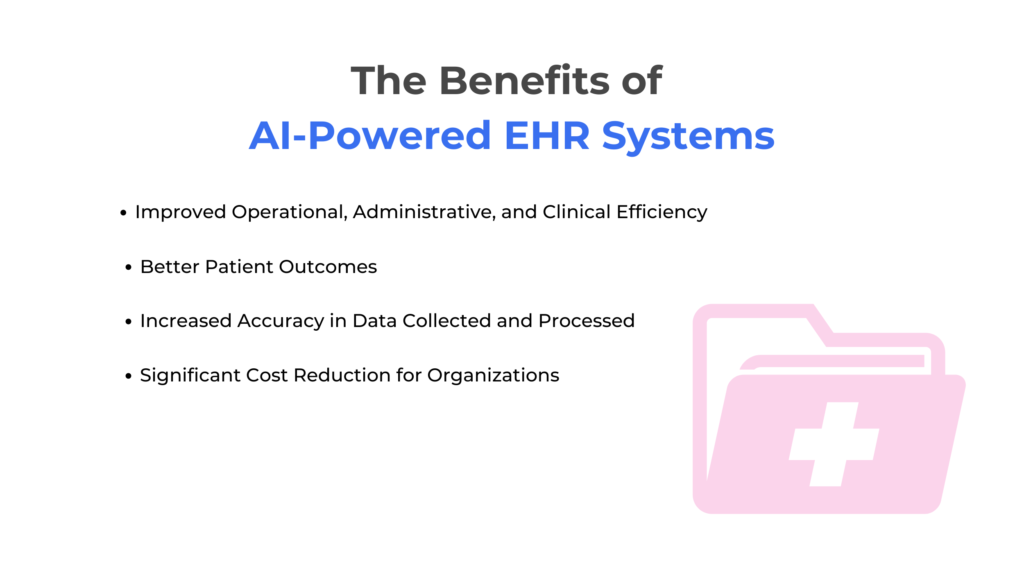
Improved Operational, Administrative, and Clinical Efficiency
AI-powered EHR systems significantly enhance the efficiency of healthcare operations. By automating routine tasks such as data entry, appointment scheduling, and billing, AI reduces the administrative burden on healthcare staff, allowing them to focus more on patient care. AI can also streamline clinical workflows by providing real-time decision support during patient consultations. For example, AI algorithms can quickly analyze patient data and suggest treatment options based on the latest clinical guidelines, helping doctors make informed decisions faster. Additionally, AI can optimize resource allocation by predicting patient demand and adjusting staffing levels accordingly, ensuring that healthcare facilities operate more smoothly and efficiently.
Better Patient Outcomes
One of the most significant benefits of AI-powered EHR systems is the potential to improve patient outcomes. AI enhances the accuracy of diagnoses by analyzing vast amounts of data, including medical histories, lab results, and imaging scans, to identify patterns and correlations that may be missed by human clinicians. This leads to earlier detection of diseases and more personalized treatment plans tailored to each patient’s unique needs. AI can also monitor patients’ progress in real-time, alerting healthcare providers to any changes that may require intervention, thereby preventing complications and improving overall patient care.
Increased Accuracy in Data Collected and Processed
AI-powered EHR systems enhance the accuracy of the data collected and processed within healthcare organizations. Traditional methods of data entry and analysis are prone to human error, which can lead to incorrect or incomplete patient records. AI mitigates these risks by automating data entry, flagging inconsistencies, and cross-referencing information from multiple sources to ensure that patient records are accurate and up-to-date. Moreover, AI can interpret unstructured data, such as doctors’ notes and diagnostic reports, more effectively than traditional EHR systems, leading to a more comprehensive and reliable patient record.
Significant Cost Reduction for Organizations
The integration of AI into EHR systems can lead to substantial cost savings for healthcare organizations. By automating routine administrative tasks, AI reduces the need for additional staffing, thereby lowering labor costs. Furthermore, AI’s ability to improve the accuracy of diagnoses and treatment plans reduces the likelihood of costly medical errors, such as incorrect diagnoses or inappropriate treatments. AI can also streamline the billing process, ensuring that claims are submitted accurately and promptly, which minimizes revenue loss due to claim denials or delays. Overall, the use of AI in EHR systems can make healthcare delivery more cost-effective, allowing organizations to reinvest savings into improving patient care and expanding services.
Legal Issues of AI Use in EHR
As Artificial Intelligence (AI) becomes increasingly integrated into Electronic Health Records (EHR) systems, several legal issues arise that healthcare providers and organizations must navigate. One of the primary concerns is data privacy. The use of AI in EHR involves processing vast amounts of sensitive patient data, including medical histories, genetic information, and treatment records. This data is protected under regulations such as the Health Insurance Portability and Accountability Act (HIPAA) in the United States, which sets strict guidelines for the storage, sharing, and use of patient information. AI systems must comply with these regulations to ensure that patient data is handled securely and confidentially.
Another significant legal issue is the potential for bias and discrimination. AI algorithms are trained on existing data, which may contain biases reflecting historical inequalities in healthcare. If these biases are not identified and mitigated, AI systems could perpetuate or even exacerbate disparities in healthcare delivery. This could lead to legal challenges under anti-discrimination laws, as patients from marginalized groups might receive suboptimal care due to biased AI recommendations.
Intellectual property (IP) rights also pose a challenge. The development of AI algorithms often involves contributions from multiple stakeholders, including healthcare providers, software developers, and data scientists. Determining who holds the IP rights to AI-generated insights or innovations can be complex, especially when these insights are derived from patient data. Legal frameworks must evolve to address the ownership and use of AI-generated data and technologies in EHR systems.
Finally, liability is a critical concern. If an AI system used in EHR makes an error that results in harm to a patient, determining who is responsible can be legally challenging. Questions arise over whether liability falls on the software developers, the healthcare providers who used the system, or the institution that implemented the AI technology. As AI continues to play a more significant role in healthcare decision-making, establishing clear guidelines on liability will be essential to protect both patients and healthcare providers.
Ready to Innovate? Start Leveraging AI to Transform Your EHR System
AI is completely changing the healthcare industry and its integrations into EHRs is one of the most promising developments in this technology. By enhancing efficiency, improving patient outcomes, increasing data accuracy, and significantly reducing costs, AI-powered EHR systems offer substantial benefits to healthcare providers, patients, and organizations alike. However, the adoption of AI in EHR also brings with it a host of legal considerations, including data privacy, potential bias, intellectual property rights, and liability issues. As the healthcare industry continues to navigate these challenges, it’s clear that AI will play a central role in shaping the future of medical records and overall healthcare delivery.
Achievion Solutions specializes in delivering cutting-edge AI-powered solutions tailored to the healthcare industry. With a proven track record of success, we empower organizations to harness the full potential of AI to revolutionize their EHR systems. If you’re ready to transform your healthcare operations with a robust AI solution, contact Achievion today. Let us help you enhance patient care, streamline processes, and achieve superior outcomes.








